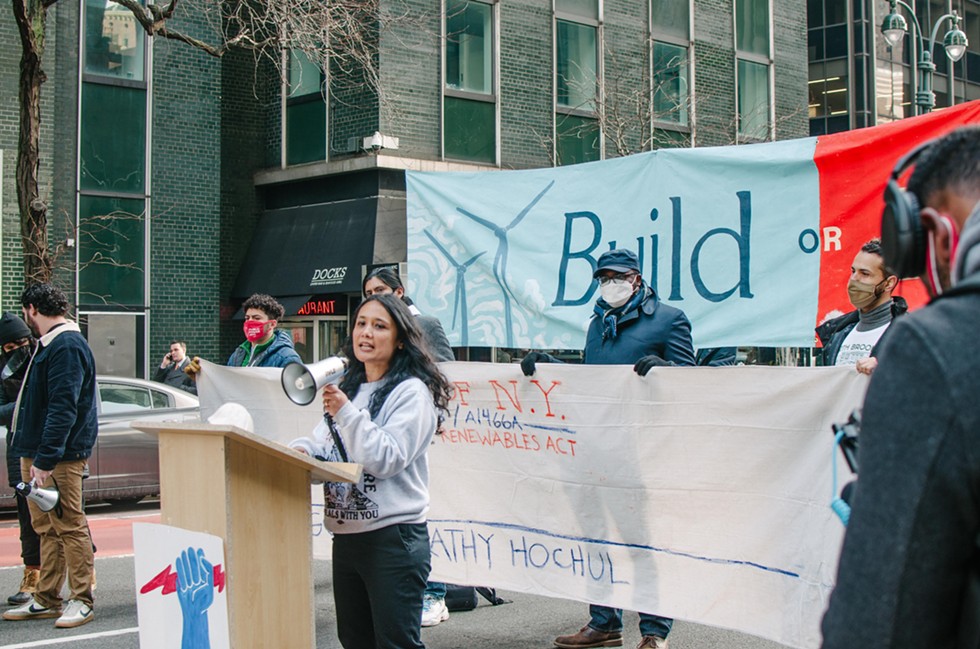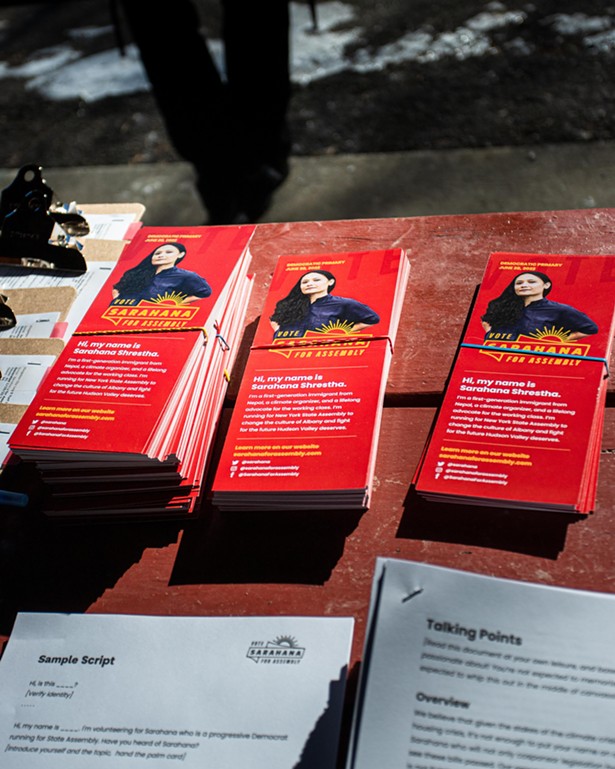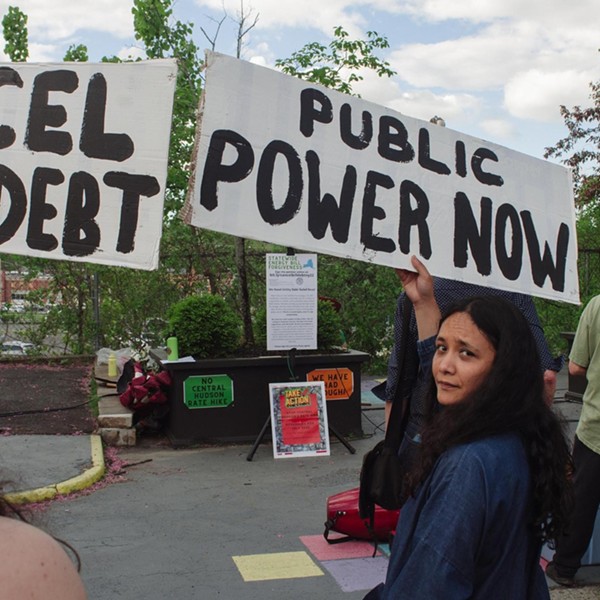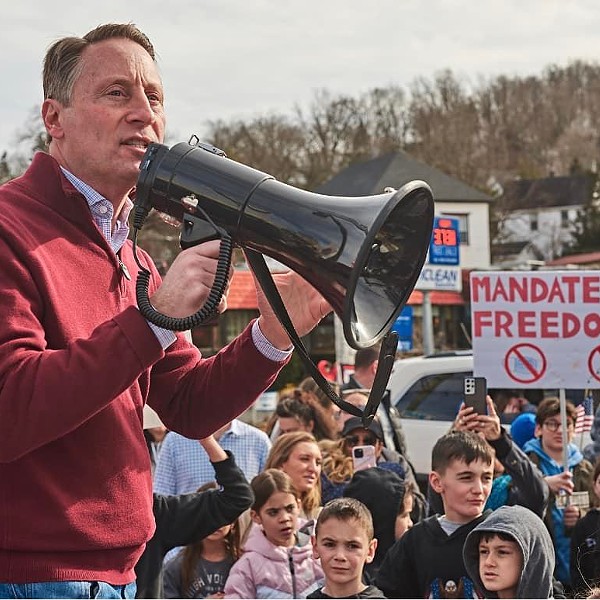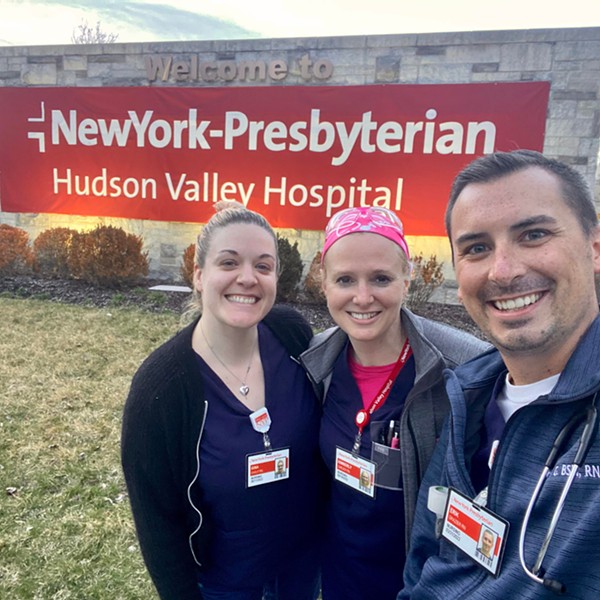The incumbent Sarahana Shrestha is primarying in Assembly district 103, Kevin Cahill, has such deep roots in the district straddling Dutchess and Ulster counties that when volunteers from her campaign regrouped after a canvass on February 13, they realized that two different pairs of them had knocked on the doors of two of his sisters.
But Shrestha, who moved to the United States from Kathmandu, Nepal as a student and now lives in the small town of Esopus with her husband, their dog, and their chickens, isn’t intimidated by the challenge—or by the perception that she is a newcomer to the area. In fact, her campaign wagers that that could be a key to their success, and it’s part of why 20-odd volunteers were motivated to show up in Kingston on a frigid Sunday afternoon last month. Those volunteers, and Shrestha’s belief in the power of mass politics and the working class, have given her campaign momentum. On March 2, the New York Working Families Party named her as one of its nine endorsements for state Assembly—ending a streak of 20 years of endorsements the party made for Cahill.
Shrestha “has the energy and attitude to get in there and shake things up,” Alex Turnqist, a woodworker who has lived in the area for over a decade, said at the February canvas, stomping his feet to keep warm while waiting to be assigned a list of registered Democrats’ doors to knock.
Speaking to the group of volunteers gathered at Kingston’s Forsyth Playground, Shrestha emphasized how her biography and her sense of urgency over the climate crisis intertwine. She became a citizen in 2019, she says, primarily because she wanted to step up her political activism: “I felt like I needed to put in more time because our time is running out.”
It’s a theme that runs through her campaign, which sells sweatshirts printed with a grim reaper framed by the words “Green New Deal before it deals with you.” Shrestha wore one at the canvass, along with black pants and black ankle-height snowboots, her rust-orange puffer coat unzippered to showcase the design. “Climate change has no flexible timeline. It’s set by nature and by reality. But the legislature works as if the timeline is negotiable,” she said to the nodding crowd.
Later, she told me that she waited until after her citizenship ceremony to officially join the Democratic Socialists of America, worried that her application would be rejected if she were a card-carrying socialist. Soon she became Ulster County co-chair of the Mid-Hudson Valley chapter (full disclosure: I am a member of the Central Brooklyn chapter).
That’s when she began campaigning for the New York Build Public Renewables Act (NYBPRA), a priority of the organization and its 10 current and would-be state legislators on the “DSA for the Many” slate. Aiming for what scholars and ecosocialists such as Alyssa Battistoni and Jedediah Britton-Purdy call “democratic decarbonization,” NYBPRA would widen the New Deal-era New York Power Authority to build, develop, and make renewable energy available to state institutions and to individuals who currently have no choice but to pay through the teeth for often-unreliable investor-owned utilities. Researchers found that the bill could create up to 51,000 jobs and add up to $90 billion to the state economy by 2030. Yet it stalled out this past summer.
When Shrestha was stumping for NYBPRA, she was disappointed in how hard it was to reach Cahill. “He was dismissive, and we couldn’t get ahold of him for two weeks,” she recalls. It was at that point that a group of Mid-Hudson Valley DSA activists decided that someone among them should run against him. “Other people decided, not me,” she says.
But she quickly understood the serious impact that she could have. All of the DSA-endorsed socialists currently in the state legislature are from New York City. “Because progressive legislation is typically pushed from the city, Albany can say, ‘Oh, these are just the city socialists,’” Shrestha says. “They’re able to pull on that so-called upstate-downstate divide.”
But she doesn’t think that her district is afraid of socialism; in addition to the people coming out for her campaign, who trend younger, there are the “older communists” who live in Woodstock and the surrounding area (there are also Buddhists, she adds, who are excited that she’s from Nepal). All the same, she’s not prescriptive about the word, and it doesn’t appear on the orange flyer she distributes. They’re more likely to win by focusing on the issues, she thinks. “We need that progressive block to be statewide.”
The case for public power was underlined when tens of thousands of people in Ulster County lost power for days after an ice storm on February 4, an event that quickly became a focus of Shrestha’s campaign. “Ask how people are doing, see if they need anything,” she instructed the volunteers before they set off to different corners of Kingston.
That’s what she does when she goes door to door. Shrestha always canvasses with her husband, Peter Cavanaugh, who keeps track of the list for the day and tells her the next person’s name as they walk up the sidewalk together. The campaign uses an app that spits out addresses; when one is farther than walking distance, they pile into their car and listen to a CD of the Strokes’ Is This It while they drive to the next cluster of houses.
On February 13, an older woman wearing cheetah-print pajamas and hair rollers opened the door of her light-blue townhome. She’s a nurse in the process of retiring, she said, exhausted by the staffing shortages, and she’s glad to meet Shrestha, because “these days, nothing is better, and everything is worse.”
When she hears that Shrestha is running against Cahill, she lights up. “Oh, my husband will be thrilled,” she says. “[Cahill]’s been there for so long, I just want to say, ‘Get him out of there.’”
That feeling—that things are getting worse—animates many of the conversations that day. “People are really struggling and need very little convincing when it comes to [universal] health care,” Shrestha says. She promises to push for the New York Health Act, another piece of progressive legislation that keeps floundering despite its popularity and the legislature’s Democratic supermajority. “People are really struggling when it comes to pricing and access. There’s also a concern that the hospitals are overcrowded and understaffed.”
Housing is another problem; home prices in Kingston, the population center of the 103rd district, have skyrocketed since before the pandemic. According to Zillow, in February 2020 the average home was $244,000; as of February 2022, the average home was $360,000. In July 2021, Kingston was crowned the “hottest market in the country.” Renting is a whole different story; as of February, there were only about a dozen apartments to rent listed on Zillow. But on Airbnb, there were over 300 listings for March and April, with an average nightly price of $283.
That means the working-class people who have long called Kingston home risk being priced out, and after Governor Kathy Hochul let the state eviction moratorium expire on January 15, they face the very real danger of being kicked to the street.
Trend pieces and real estate agents alike have attributed the market increase to young Brooklynites seeking more space than they could get in the city. But that ignores the very real motivation of profit. The explanation isn’t just that there’s a dearth of housing stock, and Shrestha is skeptical of solutions built around it.
“Yes, we absolutely need new affordable housing stock, but it’s being done in a band-aid way. People who are already housed are getting priced out,” she tells me. “The first step is stabilizing the rental housing market, making sure that people who are already housed can renew their lease if they haven’t done anything wrong.”
To that end, Shrestha supports both Good Cause Eviction, which passed recently in Kingston, and the Tenant Opportunity to Purchase Act, a Senate bill that would give tenants a chance to purchase their homes before landlords make a sale. While knocking doors, she says, she’s also heard from a number of older homeowners, now confronted with soaring property taxes and pressure to sell, who are interested in downsizing to a single-level apartment and renting out the rest.
Cahill—who did not respond to multiple requests for comment—is a cosponsor of the Good Cause Eviction bill in the Assembly. While he has not signed onto the Build Public Renewables Act, he has introduced two of the 11 priority bills backed by the Climate Can’t Wait coalition.
There’s good reason to believe that Shrestha’s bid can be successful; that the real sense of urgency for material change and the feeling of stasis that comes from such a long incumbency can turn out voters. But first, she needs to get on the primary ballot, which requires collecting 500 signatures (though most candidates try to collect more). Petitioning season kicked off statewide on Tuesday, as signature requirements for non-incumbents were reinstated after two years of pandemic-related waivers. The Democratic primary is June 28.
You don’t have to look far for a recent example of an insurgent candidate upsetting a long-time incumbent: last year, Phil Erner, a farmer who bikes everywhere and who crashed the local Democratic party playing a saxophone on the night of the primary, unseated Ulster County Legislative Chairman Dave Donaldson. His Kingston district is entirely within the 103rd Assembly district, and when he canvasses, he says he works double-duty to check in with his constituents and tell them about Shrestha’s campaign. Donaldson, like Cahill, had served for over two decades, and many of the people volunteering on Shrestha’s campaign, herself included, worked to unseat him.
“Cahill is very popular—he lives here, and he has a lot of support. He gets money for projects and shows up to events,” Erner says, acknowledging the challenges ahead. “But what I’ve found in talking to people is a general dissatisfaction with the government’s unambition.”
Even before the Working Families Party endorsement, there was evidence that New York politicos were beginning to take notice of Shrestha and her campaign. On February 24, Carl Heastie, the Speaker of the New York Assembly, tweeted a screenshot of his virtual guitar lesson. Visible in his internet browser was an open tab with the google search “kevin cahill primary.”







